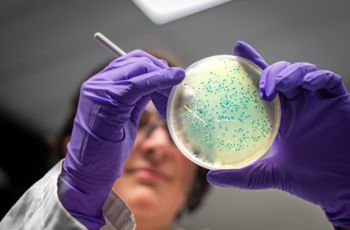As advancements in medical treatments and technologies accelerate, the demand for professionals to oversee and assist in the design and conduct of clinical trials has never been higher. Regulatory affairs and clinical research professionals play a variety of crucial roles ensuring these clinical trials are designed properly and run efficiently, ethically, and in compliance with regulatory standards.
If you are looking for a rewarding career at the intersection of science, management, and patient care, becoming a regulatory affairs or clinical research professional could be the path for you. In this article, we’ll cover everything you need to know about pursuing a career in regulatory affairs and clinical research leadership, including job titles and duties, necessary skills, educational requirements, and career outlook.
What is a clinical research professional?
Clinical research professionals tackle a variety of roles and responsibilities for clinical research and trials. People in these roles are often responsible for designing, managing, and overseeing the scientific, administrative, patient care, analytical, medical, and operational aspects of clinical trials.
You’ll find clinical research professionals working in locations such as hospitals, clinics, research and medical centers, pharmaceutical, medical device, and biotech companies, contract research organizations, and regulatory and governmental agencies. Some work directly with patients s while others work behind the scenes, ensuring that studies are designed and conducted safely and efficiently while maintaining compliance with regulations set by organizations like the Food and Drug Administration (FDA) and Institutional Review Boards (IRBs).
“Clinical research professionals drive health care innovation by playing key roles in developing safer and more effective medications, medical devices, and diagnostics,” says Kathleen Thoma, EdD, at the George Washington University School of Medicine and Health Sciences (GW SMHS).
In the health care ecosystem, these professionals bridge the gap between researchers, health care providers, sponsors, and regulatory agencies to help bring life-changing medical treatments, devices, and therapies to patients safely and efficiently.
Clinical research leadership responsibilities and job duties
Clinical research professionals have many different job titles and wear many hats, working across multiple aspects of clinical trials and research projects. Common responsibilities include:
- Managing budgets and contracts to ensure resources are allocated appropriately;
- Ensuring regulatory compliance, including adherence to FDA guidelines, IRB protocols, and ethical standards;
- Overseeing study conduct, data collection and reporting, ensuring accuracy and quality;
- Collaborating with research teams, sponsors, and health care professionals to achieve project goals;
- Monitoring patient safety and the ethical treatment of trial participants;
- Recruiting, screening, and consenting research participants as well as implementing study visits.
- Creating project timelines and managing workflows to keep studies on track.
Clinical research leadership roles require keen attention to detail, excellent organizational skills, leadership ability, strong interpersonal communication and teamwork skills, multi-tasking abilities, an understanding of medical terminology and concepts, and an ability to navigate complex health care and regulatory landscapes.
Skills, knowledge, and attitudes needed to succeed in clinical research leadership careers
The Joint Task Force for Clinical Trial Competency, an international team of clinical research professionals, investigators, and educators, has designed a framework of eight competency domains that are necessary for highly functioning clinical research professionals.
These domains of skills, knowledge, and attitudes include:
- Scientific Concepts and Research Design,
- Ethical and Participant Safety Considerations,
- Investigational Products Development and Regulation,
- Clinical Study Operations and Good Clinical Practice,
- Study and Site Management,
- Data Management and Informatics,
- Leadership and Professionalism, and
- Communications and Teamwork.
With health care and research continually evolving, staying up to date with industry regulations and best practices is critical to long-term success.
What is a regulatory affairs professional?
Regulatory affairs is a foundational pillar across various pharmaceutical, medical device, and biotechnology industries, ensuring drugs and devices comply with legal and regulatory standards related to safety, quality, and efficacy while supporting business objectives, such a timely approval and market entry.
Professionals in this field ensure that medical products comply with all relevant government regulations throughout their development, manufacturing, and marketing lifecycles by interpreting and applying laws, managing documentation, and collaborating with different departments to guarantee product safety and efficacy. They act as the bridge between a company or researcher and regulatory agencies such as the Food and Drug Administration to ensure proper product launch and market access.
Regulatory affairs professionals are key players in the development of new medical products because they determine the most appropriate regulatory classification and the best submission route for the approval pathway for each product. They work to anticipate regulatory risks, such as data integrity issues, and develop contingency plans that might include changes in trial design. They also monitor regulatory trends and competitor developments.
The duties of regulatory affairs and clinical research professionals complement, support, and often overlap with each other, allowing career mobility between roles. While clinical research professionals focus on designing, managing, and overseeing clinical trials, regulatory affairs professionals make sure those same trials and the products being developed, meet the regulatory requirements to move forward and achieve approval so they can be marketed to the public. They are both important for the safe and successful development and approval of medical products.
The skills, knowledge, and attitudes needed to succeed in regulatory affairs careers are similar to those for clinical research professionals, with a focus on regulatory aspects. Our regulatory affairs curriculum is based on the principles proposed by the Regulatory Affairs Professionals Society (RAPS) and the Association of Global Regulatory Educators (AGRE).
What regulatory affairs careers are there?
For those driven to make a lasting impact on developing innovative treatments to improve health and wellness, a career in regulatory affairs presents a profound opportunity to shape the future of the field, delivering cutting-edge solutions with the utmost integrity and public trust.
Curious about what opportunities are out there? Take a look at this sampling of regulatory affairs careers in health care:
- Regulatory affairs specialist: This professional acts as a conduit between drug, medical device, and biotechnology companies/researchers and regulatory agencies. They play an important role in ensuring products, from medical devices to pharmaceuticals, comply with all regulatory requirements, helping to safeguard public health while facilitating market access for innovative therapies.
- Quality assurance manager: Tasked with critical oversight of processes and procedures, this role ensures that health care products consistently meet established quality standards. Their work is instrumental in maintaining the high quality of health care products that reach consumers, bolstering safety and efficacy.
- Regulatory affairs consultant: Offering specialized knowledge on regulatory legislation, this consultant guides drug, medical device, and biotechnology companies/researchers through the complexities of the regulatory environment. They provide strategic insights to achieve compliance efficiently, minimizing risks and facilitating a smoother path to bringing new medical innovations to market.
- Regulatory compliance officer: This position oversees adherence to legal and ethical standards, ensuring that all health care practices and products meet stringent regulatory criteria. They play a key role in maintaining organizational compliance with federal, state, and industry regulations.
Regulatory affairs and clinical research leadership salary and career outlook
The outlook for regulatory affairs and clinical research professionals is strong, driven by an increase in clinical trials, health care innovation, and a growing emphasis on regulatory compliance.
Salary expectations for regulatory affairs and clinical research professionals
The earning potential for these roles is dependent upon a variety of factors, including the job role, education, experience, geography, and employer. On average, entry-level regulatory affairs and clinical research professionals can expect salaries ranging from $60,000 to $76,000 annually.1 Senior roles or leadership positions in larger organizations can earn even higher salaries. According to ZipRecruiter, the average annual salary in 2025 in the US was $95,411 for a regulatory affairs specialist and $107,336 for a clinical research program manager.3,4
Regulatory affairs and clinical research leadership career growth
“With the current rapid advancements in healthcare and technology, the regulatory affairs and clinical research industries are experiencing substantial growth, now is an ideal time to pursue a career in one of these fields, as there is a growing demand for skilled professionals to drive health care innovation and improve patient outcomes,” says Thoma.
The U.S. Bureau of Labor Statistics projects significant growth in health care occupations and research-related roles, with an increasing demand for professionals to oversee clinical trials and regulatory strategy. As pharmaceutical and medical device companies, health care institutions, and biotech firms expand their research capabilities, regulatory affairs and clinical research professionals will continue to play a pivotal role in bringing treatments to market.
Regulatory affairs and clinical research leadership education and training requirements
Becoming a regulatory affairs or clinical research professional typically begins by earning a bachelor’s degree in health care, life sciences, or a related field. However, to excel in this competitive industry, advanced education and specialized training can set you apart.
The George Washington University School of Medicine and Health Sciences (GW SMHS), for example, offers three program options that are specifically designed to equip students with the skills and expertise necessary to excel in the complex and evolving field of clinical research leadership and regulatory affairs:
MSHS in Regulatory Affairs and Clinical Research Leadership
This fully online master’s program is designed for professionals aiming to advance their careers in clinical research and regulatory affairs. The curriculum combines leadership development with a deep understanding of global regulatory processes and clinical trial management.
The program can be completed in as few as 24 months.2 Graduates are well-prepared to take on roles such as clinical research coordinators, associates, operations managers, team leaders, regulatory affairs specialists, or compliance officers, contributing to the successful execution and oversight of clinical trials.
Key highlights include:
- A comprehensive curriculum covering clinical trial operations, regulatory strategy, health care compliance, and ethical research practices,
- An emphasis on leadership skills to prepare students for senior roles in health care, biotechnology, and pharmaceutical industries, and
- Flexibility that allows working professionals to complete coursework on their own schedules.
Graduate Certificate in Clinical Research Administration
For professionals looking to build or enhance their knowledge in clinical research, the graduate certificate provides a shorter, more focused option that includes key courses from the master’s program. This program can be completed in as few as 14 months and is ideal for those seeking career advancement or considering a future master’s degree.2
Graduate Certificate in Regulatory Affairs
The regulatory affairs certificate program was developed in collaboration with industry professionals from federal agencies including the FDA. The program integrates global regulatory strategies across its curriculum, targeting drug and device development. Delivered fully online in as little as 14 months, this is a great option for those entering the field or looking to gain specialized knowledge.2
Key highlights of both graduate certificate programs include:
- A curriculum designed to provide essential skills in clinical research operations, project management, and regulatory compliance,
- A fully online format for maximum convenience, allowing students to balance their education with professional responsibilities, and
- Since students take a subset of the same courses as those in the master’s degree program, there is the option to apply credits from the certificate toward the MSHS program if students decide to pursue an advanced degree later.
Why choose GW for regulatory affairs and clinical research leadership?
“The curricula in GW’s Regulatory Affairs and Clinical Research Leadership programs are tailored to the competencies sought by employers in these fields. The knowledge and skills gained at GW SMHS will give students a competitive edge in the job market,” says Thoma.
GW SMHS boasts a 200+ year legacy of academic excellence in health care programs that stand out for their quality and innovation. Here are a few reasons why GW is a leader in clinical research and regulatory affairs education:
- Renowned reputation: Our clinical research and regulatory affairs programs are nationally recognized for preparing leaders in the health care and research industries. Our programs are highly regarded for their focus on quality, innovation, and career readiness.
- Flexible learning options: GW’s clinical research and regulatory affairs programs are offered in a fully online format, providing the flexibility professionals need to balance their careers, education, and personal commitments. Students can access a rigorous curriculum from anywhere, allowing them to advance their skills without putting their careers on hold.
- Expert faculty and cutting-edge curriculum: Students in our clinical research and regulatory programs benefit from mentorship and instruction by experienced faculty who are leaders in regulatory affairs and clinical trial management. The curriculum blends theory with real-world application, incorporating the latest advancements in clinical research and health care compliance.
- A path to career advancement: GW SMHS programs equip you with the skills needed to lead clinical research teams, manage trials, and plan regulatory strategy across various industries, including health care, pharmaceuticals, and biotechnology.
Pursue an impactful career in regulatory affairs and clinical research leadership
Clinical research and regulatory affairs professionals play a critical role in advancing health care by overseeing safe, ethical, and effective clinical trials and managing regulatory strategy for development and approval.
If you’re ready to embark on this exciting career path, start planning your next steps to obtain the necessary qualifications. Explore our programs:
- MSHS in Regulatory Affairs and Clinical Research Leadership
- Graduate Certificate in Clinical Research Administration
- Graduate Certificate in Regulatory Affairs
1 Salary.com, Clinical Research Associate I salary (retrieved December 2024)
2 The total number of credits and duration of the program depend on the number of transferred credits.
3 Ziprecruiter.com, Regulatory Affairs Specialist Salary, (retrieved April 2025)
4 Ziprecruiter.com, Clinical Research Manager Salary (retrieved April 2025)



